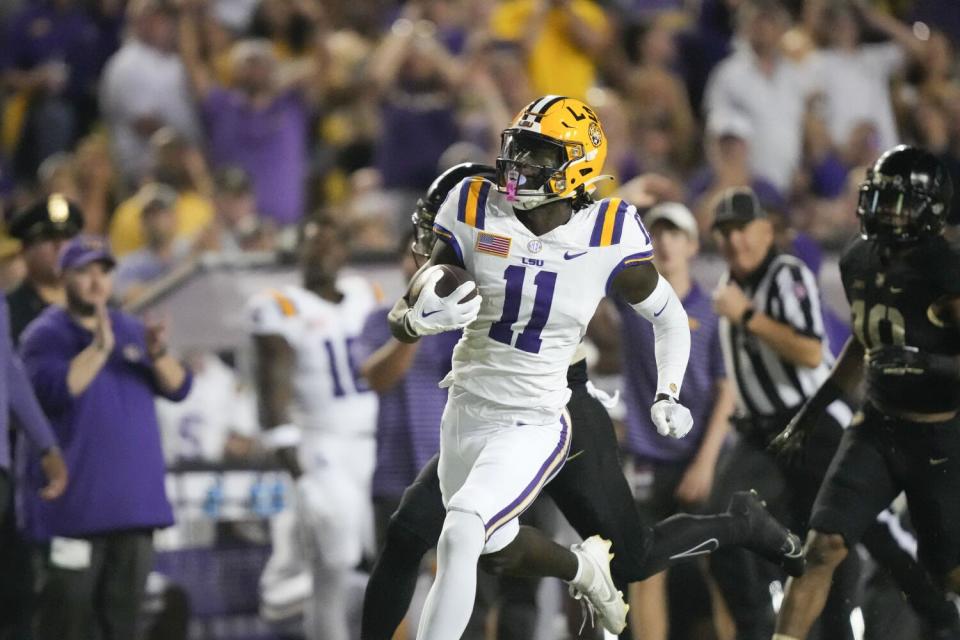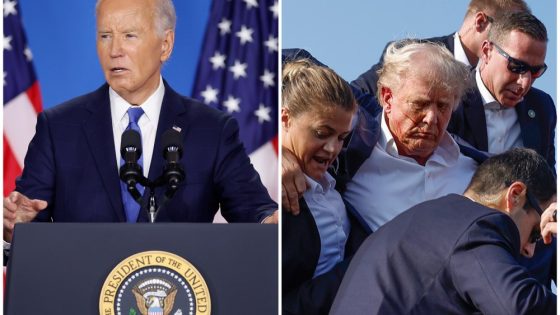Through his first four seasons, he has thrown for 17,223 yards, the most to begin an NFL career.
Justin Herbert’s aerial antics have become quite familiar. The circumstances around the Chargers, however, have turned rather foreign.
Nearly 85% of Herbert’s yards to date have gone to players no longer on the roster, a biting reality to consider as the team prepares for the 2024 draft.
Gone from last season are wide receivers Keenan Allen and Mike Williams, running back Austin Ekeler and tight end Gerald Everett.
In free agency, the Chargers beefed up their backfield and signed one of the league’s top blocking tight ends as new coach Jim Harbaugh put into motion his promise to make the team more physical.
Read more: Chargers ready to trade No. 5 pick in NFL draft if the price is right
This, to be certain, is a new era for the franchise, something Harbaugh made official in February by announcing his intention to play a brand of football that would make proud Vince Lombardi, a man who last coached in the NFL in 1969.
“We want to have an identity as an offense,” coordinator Greg Roman said after being hired, “and we want that to be a strong and powerful identity.”
As for the concept of balance, Roman said, “If they want to make us play left-handed, I want to be able to throw punches with my left hand.”
Herbert still possesses a record-setting right arm, however, and the Chargers would be doing an injustice if they didn’t attempt to flex that potential while pursuing run-pass harmony.
All of this means Herbert needs wide receivers in order to be that Herbert and, right now, his position group is about as thin as a midfield stripe. Nearly every mock draft understandably has the Chargers picking a receiver early.
Read more: NFL mock draft live: 32 team reporters make their first-round picks
On Thursday night, they have the fifth overall selection, an envious spot with the likes of Marvin Harrison Jr., Malik Nabers and Rome Odunze sitting atop a deep class of wide receivers.
In recent weeks, there has been ongoing national debate during which each of those three prospects has been touted at one time or another as being the best overall or most promising or surest thing.
In other words, the Chargers probably couldn’t go wrong with any of them, which isn’t often the case in an exercise as fickle and inexact as the NFL draft. Remember Ryan Leaf?
In need of multiple players who can contribute in 2024, the Chargers could trade back from No. 5 and accumulate draft capital while still targeting a receiver early. In this scenario, Brian Thomas Jr., Adonai Mitchell and Keon Coleman are names to consider.
Just a few days out, there remains plenty of league-wide mystery beyond the expectation that Chicago will select former USC quarterback Caleb Williams at No. 1.


“The draft is the draft,” Chargers general manager Joe Hortiz said last week. “You think you know what it’s going to do, but you really don’t until it actually happens.”
There is no question, however, that the Chargers need to add talent at a position where they traded away Allen and released Williams because of salary-cap limitations.
The lone proven wideout on the roster is Joshua Palmer, who is entering his fourth season. The new coaching staff has made it clear that they project Palmer to emerge even more now with an increased role.
A year ago, the Chargers’ previous regime used its first-round selection — No. 21 overall — on receiver Quentin Johnston, who had a rocky rookie season marked by limited production and dropped opportunities.
Hortiz explained Johnston’s struggles as typical of what many first-year players go through. Still, the questions about Johnston’s ability to hold on to the ball began minutes after he was drafted and remain today.
Read more: Why Jim Harbaugh jumped at chance to live ‘The Rockford Files’ RV beach life
“Every time I put on the tape, you see the talent,” Hortiz said. “I expect him to make a jump.”
There is hope among the Chargers’ new staff that Johnston will respond to a fresh start and a revamped approach. Hortiz said all the players should be boosted by the clean-slate landscape before them.
“We want to be able to coach them and see how they respond to our coaching and what we want to do,” he said. “It (the results) could be completely different. … That’s an exciting thing.”
If the season began today, the Chargers’ No. 3 wideout would be Derius Davis, who played just 13% of the team’s offensive snaps as a rookie in 2023. Behind him would be Simi Fehoko, who caught one pass last season.
Of course, the season doesn’t begin today, a fact Hortiz and Harbaugh repeatedly have reminded reporters about in recent weeks.
The season doesn’t begin until September, giving the Chargers time to find targets for Herbert, their first — and no doubt most fruitful — chance coming Thursday night.
This story originally appeared in Los Angeles Times.
Source Agencies


